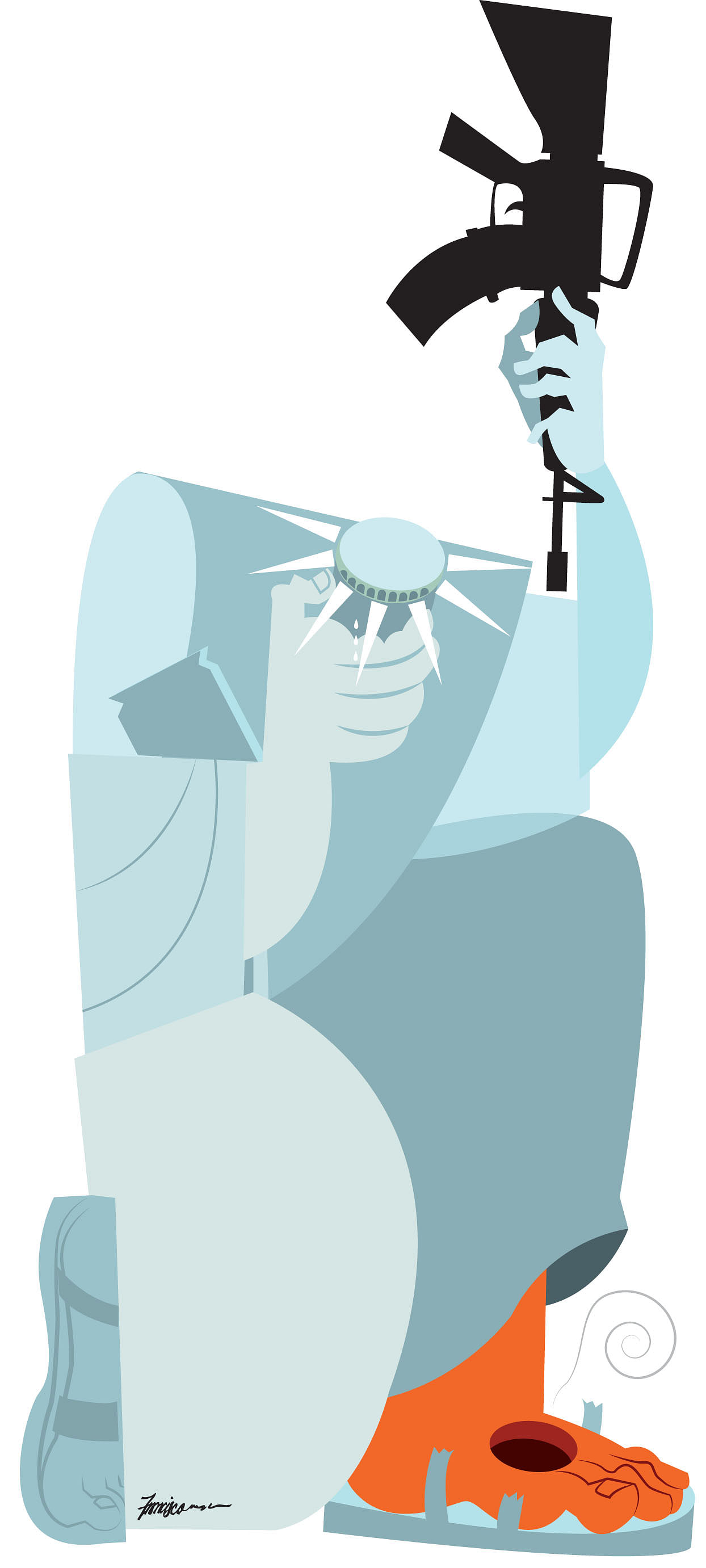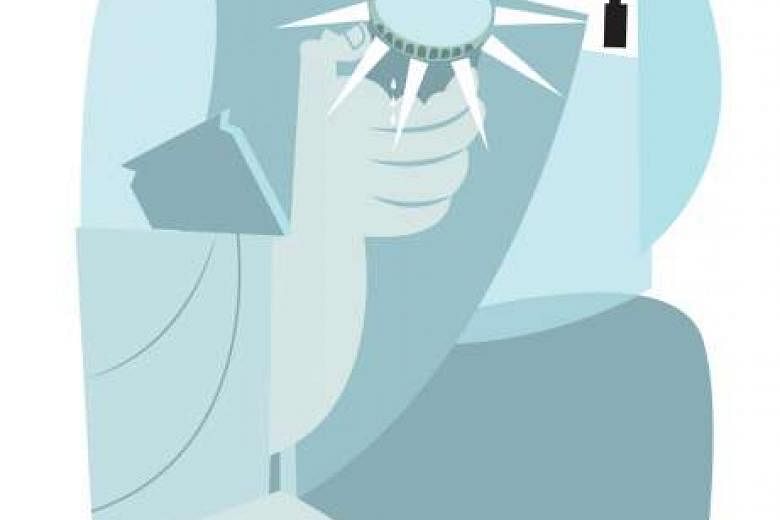WASHINGTON • Every once in a while - especially when the case is particularly tragic, as it was last week in Oregon - a mass shooting incident in the United States makes the news in Singapore.
For outsiders looking in from a distance, the gun violence problem can often feel all at once foreign and inexplicable.
It feels that way because it just doesn't make sense that a country like the US cannot come to terms with what is an obvious problem with an obvious solution. If you have too many shootings, make it harder for people to get guns. Other countries have tried it and there are indisputable studies elsewhere showing that fewer guns lead to less gun violence.
Australia had its worst mass shooting in 1996 when a young man killed 35 people in a rampage. Strict gun laws were put in place and the country hasn't had a single mass shooting in the two decades since.
But perhaps what is more worrying this time isn't just the inability of the US to tackle a deadly problem, but the slow shift towards acceptance - acceptance that shootings are just a way of life.

The pledges of action that followed the Sandy Hook Elementary School shooting in 2012 were notably absent in the reaction to the killings at Umpqua Community College in Oregon last week. Rather, the prevailing emotions were frustration and hopelessness. What should be outrageous has become, in US President Barack Obama's words, "routine" for a people who have become "numb".
It's almost as if Americans are giving up.
CHANGING MOOD ON ISSUE
Mr Obama's reaction to the Oregon shooting was perhaps the best indicator of how the mood on the issue is changing. Although the speech was moving, it appeared to lack the defiance of his remarks in response to earlier shootings.
In December 2012, after 20 children and six adults were murdered in Sandy Hook, Mr Obama laid down a clear marker.
"We can't tolerate this any more. These tragedies must end. And to end them, we must change," he said then as he tallied up the major shootings in the decade before.
"If there is even one step we can take to save another child or another parent or another town from the grief that has visited Tucson and Aurora and Oak Creek and Newtown, and communities from Columbine to Blacksburg before that - then surely we have an obligation to try."
There was a real sense in 2012 that the one silver lining from the tragedy was that the horror of it presented the best chance of a wake-up call for legislators on gun control.
A Pew survey a month after that shooting found that 51 per cent of Americans supported gun control, while 45 per cent wanted to protect gun rights.
Just before the shooting, only 37 per cent thought gun ownership was a safety threat.
Yet, just a few months later, everything seemed to take a step backwards. According to the Law Centre to Prevent Gun Violence, by April 2013, five states had strengthened gun laws, while 10 states had weakened restrictions.
At the national level, laws tabled to ban assault weapons or impose universal background checks failed to pass Congress.
So when nine people were shot and killed in a black church in Charleston, South Carolina, this year, Mr Obama's remarks on gun control had already started to sound helpless. Although there was still a pledge of action, there was a recognition that nothing was going to change.
"At some point, we as a country will have to reckon with the fact that this type of mass violence does not happen in other advanced countries," he said.
" And it is in our power to do something about it. I say that recognising the politics in this town forecloses a lot of those avenues right now. But it would be wrong for us not to acknowledge it."
By last week, he had detached himself completely from a possible solution, even as he launched a broad attack on every major argument from the pro-gun camp. In fact, Mr Obama even seemed to take some blame for the lack of movement.
He said: "This is a political choice that we make to allow this to happen every few months in America. We collectively are answerable to those families who lose their loved ones because of our inaction."
GUN RIGHTS AND THE NRA
When talking about the relative success countries like Britain and Australia have had in getting their gun violence problems under control compared with the US, it would only be fair to note that America does have some innate disadvantages.
The first is the fact that gun ownership is a constitutionally protected right enshrined in the Second Amendment.
The other is the very American idea of rugged individualism. Distrust in the government is very much a part of the DNA for many Americans, which makes the task of disarming them all the more difficult.
That's not to say that these are insurmountable problems. After all, the logic behind the Second Amendment - to enable an armed citizen militia to rise up against an overreaching government - now no longer holds in the face of the US' advanced military apparatus.
Americans have also not shown the same vigour in defending other Constitution-guaranteed rights. The mass data collection conducted by the National Security Agency likely violates the Fourth Amendment - which prohibits unreasonable searches - but a majority of lawmakers support it anyway.
Rather, the real issue is how the gun lobby has manipulated those two traits to terrific effect. It may be difficult to fathom how one single-issue lobby group has had such a tremendous impact on the country, but the National Rifle Association (NRA) has proven itself a masterful operator. Its strategy? Divide and conquer.
Leveraging on the distrust many conservatives have for the government, the NRA has persistently pushed the message that any attempt at gun control is but a step down the slippery slope towards gun confiscation.
It also argues against the link between guns and gun violence and tries to cast shootings as a mental illness issue rather than a gun ownership one.
And given that rural conservative voters tend to form the core pro-gun demographic, the gun lobby has, over the years, successfully morphed gun rights into an identity issue.
It is no longer simply an idea to be debated but an American's stand on the matter now says something about who he or she is. Just as a true Republican must believe in smaller government, they must now also be against gun control.
As far as Congress goes, the NRA exercises its clout through funding, pouring millions of dollars into electoral races to try and defeat anti-gun rights candidates.
With those circumstances in the highly polarised climate that is currently gripping the country, it is difficult to imagine building a strong enough coalition or getting a large enough majority in Congress to beat back the influence of the NRA.
FINDING A WAY FORWARD
Yet, polarisation can be a double-edged sword.
As much as it has entrenched the NRA and contributed to today's helpless situation, it may also provide an opening to those seeking to push gun control.
As recently as the 2008 presidential election, Democratic candidates tended to steer clear of taking firm gun control positions, fearing it would alienate rural white voters in key swing states. In the 2004 campaign, then Democratic nominee John Kerry famously tried to embellish his Second Amendment credentials by going on a goose hunt in Ohio armed with a double-barrelled shotgun.
The fear is not completely unfounded. Mr Al Gore's defeat in the presidential election in 2000 and the Democrats' poor showing overall were largely blamed on his stance supporting gun control. Former president Bill Clinton's Bill that banned assault weapons in 2004 was identified as the reason for the trouncing his party received at the mid-term polls that year.
All that is clearly different today. Democratic front runner Hillary Clinton has unveiled an ambitious gun control plan. Her rivals Martin O'Malley and Bernie Sanders have both also made very strong remarks in support of gun control.
Gun control groups can also now boast more financial support than the NRA. In a 2014 report, The Guardian found that groups in favour of gun control raised US$21.3 million (S$30 million) over the past two years, compared with just US$16.3 million for the NRA.
Now these are very small things, and it would be unreasonable to expect any of this to result in a breakthrough, even if a Democrat wins the White House next year.
But it is at least a sign that the gun control camp may still be able to put up a fight, however frustrating and hopeless things can seem.


